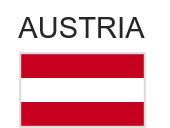The table below aims at gathering the administrative and governmental bodies of Austria, which are responsible for digital public administration policies and interoperability policies.

National
The State Secretary is responsible for digitisation, IT and telecommunications as well. In the field of digitisation, it is also responsible for coordinating tasks. In its role, the State Secretary is supported by various bodies of all relevant actors as well as by administrative units within the Federal Chancellery.

| Claudia Plakholm State Secretary in the Federal Chancellery
Contact details: Federal Chancellery Untere Donaustraße 13-15, A-1020 Wien |
| Wolfgang Ebner Acting Director General for Digitisation and eGovernment Head of the Directorate ‛Digitisation Policy and Innovationʼ President of the Secure Information Technology Centre - Austria (A-SIT)
Contact details: Federal Chancellery Hintere Zollamtsstraße 2B, A-1030 Wien |
Reinhard Posch Federal Chief Information Office
Contact details: Federal Chancellery Vordere Zollamtsstraße 5, A-1030 Wien
|
Ferdinand Scheidbach Head of the Directorate ‛eGovernment Federal Government/Public Administrationʼ
Contact details: Federal Chancellery Vordere Zollamtsstraße 5, A-1030 Wien |
Peter Kustor Head of the Directorate ‛International and Legal Affairs, Source-Pin-Register Authority, eGovernment Strategyʼ
Contact details: Federal Chancellery Vordere Zollamtsstraße 5, A-1030 Wien |
The government programme defined digital development as an interdisciplinary issue. A Chief Digital Officer (CDO) was appointed in each Ministry to coordinate innovation and digitisation issues between Ministries, and work on a nationwide innovation and digitisation strategy.
Through a coordinated approach, goals such as the further automatisation of processes or the offer of improved digital services can be realised more efficiently.
The CDO of the federal government (Joachim Tischler) is the Head of Department for Digitisation and Organisational Development in the Federal Ministry for Climate Action, Environment, Energy, Mobility, Innovation and Technology.
Even though the overall coordination of ICT and eGovernment policies and activities lies within the competence of the Federal Chancellery, the different federal Ministries and agencies are responsible for implementing their own projects.
The Directorate on Legal Affairs, eGovernment Strategy, EU and International Affairs supports the Platform Digital Austria at legal and organisational level, and represents Austrian positions at European and international level.
The Secure Information Technology Centre (A-SIT) hosts the eGovernment Innovation Centre (eGovernment Innovationszentrum, EGIZ) that was founded in autumn 2005. The EGIZ is a research unit that investigates innovative technologies and solutions for eGovernment, and represents a platform and network for research activities with respect to eGovernment solutions. In cooperation with the strategy and implementation units, the eGovernment Innovation Centre allows for closer collaboration between research and application.
With the adoption of the Federal Ministries Act in 2022, the Austrian Federal Computing Centre (Bundesrechenzentrum, BRZ) was incorporated into the Federal Ministry of Finance, transforming it into a competence centre for digitisation.
Founded in May 1999 by the current members (the Ministry for Digital and Economic Affairs, the Federal Computing Centre, the Graz University of Technology, the Danube University Krems and the Johannes Kepler University Linz), the Secure Information Technology Centre (A-SIT) is an independent non-profit association tasked with the development of expertise in the area of technical information security in service of the authorities, the economy and the citizens. Specific issues addressed include the introduction of the Citizen Card (eID), the evaluation of cryptographic methods and eGovernment security aspects. A-SIT also hosts the eGovernment Innovation Centre (eGovernment Innovationszentrum, EGIZ) that was founded in autumn 2005.
The aim of the interdepartmental Digital Skills Initiative (DKO) is for as many Austrians as possible to have basic digital skills by 2030. The initiative will result in high-quality teaching of basic digital skills to the general population in various settings in their working and private lives. A national reference framework is to be introduced so that digital skills can be measured and compared. Specific objectives in addition to building up basic digital skills include, for example, training more IT specialists, in particular female, and promoting digital talent.
To promote the scaling up of digital skills in Austria, a coordination centre/office (i.e. the Digital Competences Office) has been set up within the federal government. Among other things, it promotes and coordinates the scaling up of digital education programmes, and represents Austria and the federal government in international and national committees. The main tasks of the Office are to raise awareness of digital skills, and to establish and implement incentive and support measures to increase the population’s level of digital skills.
GovLabAustria is an innovation laboratory for the public sector operated by the University of Continuing Education Krems and the Federal Ministry of Arts, Culture, Public Service and Sports. GovLabAustria is intended to make it possible to address central challenges of the public sector in an open and interdisciplinary experimental space, and to develop cross-organisational solution approaches with the involvement of the relevant stakeholders in a scientific-practical context.
The federal government, provinces, municipalities and local communities have been working closely together for many years in the so-called Platform Digital Austria with the aim of establishing standardised, interlinked and coordinated procedures for digital government services or eGovernment. Senior representatives of regional and local governments participate in this cooperation, which is headed by the Federal Chief Information Officer (CIO) and is responsible for devising integrated eGovernment strategies. The objectives and roadmaps adopted by the platform are thus also valid for regional and local governments. These guidelines are then translated or included into regional and local strategies, for which regions (Länder) and municipal governments are responsible.
In 2023, the joint eGovernment Strategy 2023 was produced and agreed by all stakeholders, to provide guidance and point the way forward for government services in Austria.
To provide a uniform system of eGovernment, intensive cooperation across all levels of administration is required. Such cooperation is guaranteed by the support of the overall cooperation, which operates as an umbrella for all working groups open to representatives of the federal, regional and local authorities. The open participation enables the federal administration, the regions, the Austrian Association of Cities and Towns, and the Austrian Association of Municipalities to develop joint solutions for legal, technical and organisational issues. The required transparency is ensured by a common information and communication platform.
The responsibility for implementation lies with the individual states (Länder) and municipal governments.
The Austrian Association of Cities and Towns represents 258 members, including all towns with more than 10 000 inhabitants. The smallest city member has 1 000 inhabitants.
The Austrian Association of Cities and Towns is involved in the preparation of legislation and, among other things, comments on some 100 federal regulations every year expressing the point of view of local governments. Moreover, representatives of the Austrian Association of Cities and Towns are active in a number of advisory bodies in fields such as the environment or welfare.
Some 40 technical committees explore innovative measures and programmes adopted by towns and communities, issue statements on new legislation and discuss the implementation of new policies. eGovernment is currently one of their main focuses.
The Austrian Association of Municipalities (Österreichischer Gemeindebund) is the entity representing the interests of small and medium-sized municipalities in Austria. A total of 2 085 municipalities are members of the association.

